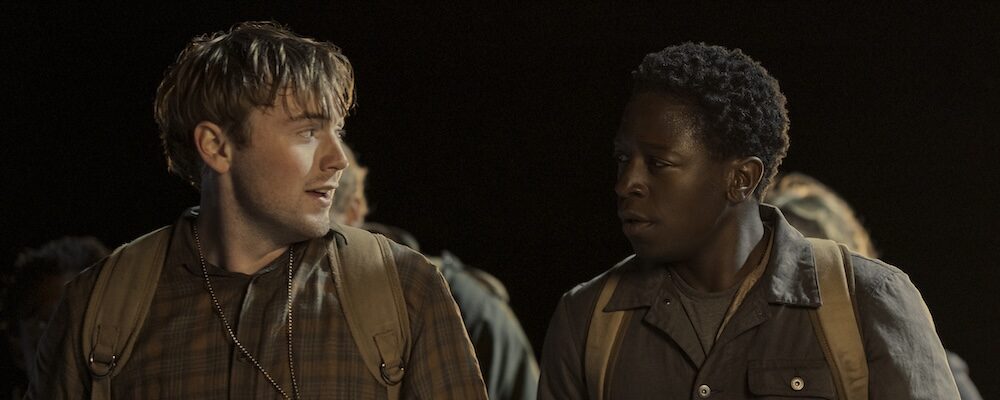‘The Long Walk’: Francis Lawrence Adapts an Early Stephen King Yarn With Wrenching Apocalyptic Emotion
Alci Rengifo
The human component of Stephen King’s best stories is the real secret behind their appeal. Monsters, ghouls, psychics and gruesome moments may get all the pop culture fame, but buried in the formulas are characters that are easily relatable. Mundane life crashes with extremes in King’s universe, which helps explain why, after decades, his material keeps getting mined for new movies and series. “The Long Walk” is a dystopian adaptation of an early King novel, published in 1979 under the pseudonym Richard Bachman. As the latest imagining of an apocalyptic America, it has one of those simple yet horrifying King premises, directed with grit and skill by Francis Lawrence. Instead of focusing too much on the apocalypse, Lawrence gets that what matters in this nightmare are the participants.
Surprise, surprise, a catastrophic war has shattered what used to be the United States and society is left in shambles. The system is now some kind of militarized authoritarian state. A military figure in fatigues, the Major (Mark Hamill), has created a brutal contest to combat a supposed epidemic of laziness. Fifty young men from all fifty states are chosen through a lottery. The unlucky elect are then made to literally walk an enormous distance nonstop with troops keeping watch. If anyone falls behind 3MPH, they get shot. The winner receives riches beyond imagining and the granting of one wish. The narrative focuses on a specific group of walkers. First, there’s Ray (Cooper Hoffman), who has a very personal reason for taking on the long walk despite the fears of his mother Ginnie (Judy Greer). Then there’s self-assured Hank (Ben Wang), rather friendly Art (Tut Nyuot), introvert Stebbins (Garrett Wareing), angry Barkovitch (Charlie Plummer) and Curly (Roman Griffin Davis), the youngest of the bunch. The walk will test their physical and mental limits while opening the door to bonding.
Friendships from youth and their importance are a constant theme in Stephen King’s most famous novels and their movie versions like “It” or “Stand by Me.” The original “The Long Walk” novel was one of King’s earliest attempts at the formula since he wrote it at 19, though it wasn’t published until 1979 under a pseudonym, Richard Bachman. While Lawrence and writer JT Mollner actually soften some of the novel’s more wrenching material, it still has a very tragic tone to the way the six lead characters get to know each other. They overcome their differences and some grow close knowing full well only one of them will probably make it out of this alive. Lawrence’s best known work remains “The Hunger Games,” which also evoked moving human relationships in a dystopia on a grander blockbuster scale. That was also a story of brutal survival.
With a smaller budget, “The Long Walk” has few heroics or action scenes. Most of the movie really is just the brutal environment of these young men walking down what feels like an endless road, their feet and shoes eventually breaking down. Visually this could be any alternate reality. Cars that look from the ‘50s sit by the road in flames. The terrain seems to be the Midwest with only a few locals ever appearing to look at the long walkers. Conversations between the young men, where they banter and reveal a bit about themselves, or try to talk about what most young men obsess over, gets interrupted by sudden bursts of horror. These tend to be when someone finally can’t take it and slows down. Then a soldier comes over and shoots them in the head. Personalities begin to break down, like cocky Hank losing his quick tongue or Barkovitch driven to near insanity. All around we get strong performances especially Cooper Hoffman, son of the late Philip Seymour Hoffman. He begins the story baby-faced and gradually turns into an endurance machine. David Jonsson as Peter has great chemistry with Hoffman, convincing us these two are becoming genuine comrades. For both of them it’s almost a way of keeping their sanity.
At first, the premise of “The Long Walk” may sound far-fetched. That’s usually a mark of good dystopia since it imagines extremes that could very well happen. Like King’s most famous apocalyptic novel, “The Stand,” this story is convincing because there is nothing unbelievable about the behaviors being presented. The Major, played with demented firmness by Mark Hamill of “Star Wars” fame, barks the kind of macho philosophy you hear from the average right-wing podcaster. With conservatives obsessed with cutting benefits or any form of social net, using laziness as an excuse, something like the long walk might just happen tomorrow. We’re living in a world going mad where power systems treat people like pawns in a survival game. At heart, that’s what “The Long Walk” is about along with its themes of friendship, which hit hard thanks to the cast. These actors prove you don’t need to splurge the budget on effects to make the apocalypse feel heartbreaking.
“The Long Walk” releases Sept. 12 in theaters nationwide.

